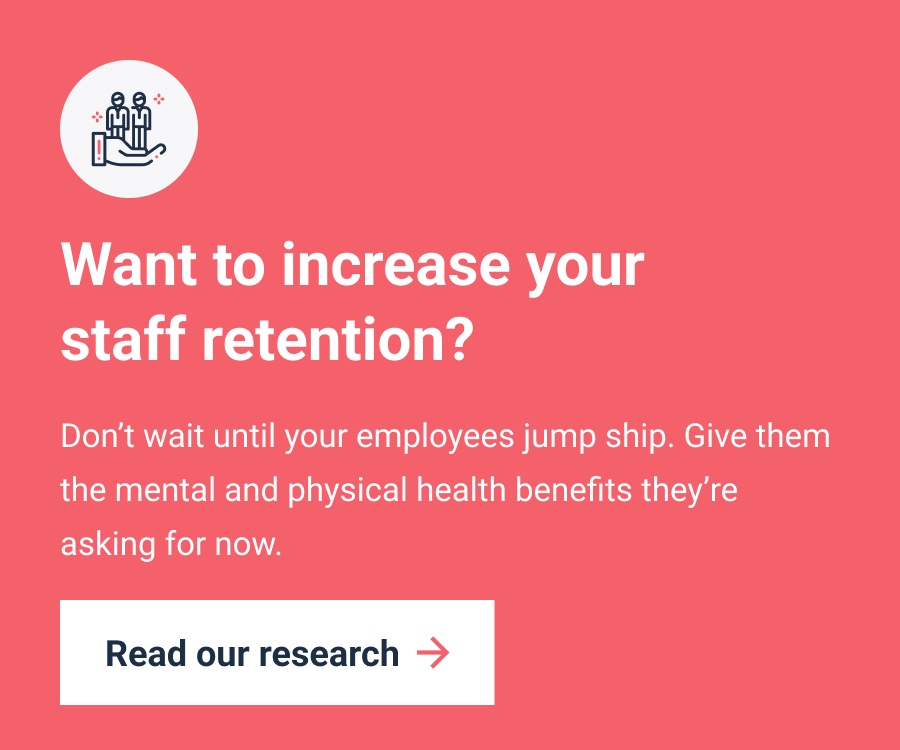If you keep your fingers on the pulse of employee benefits and wellbeing, this is not the first you’re hearing about menopause leave.
Forward-thinking companies are making headlines for going ahead with leave policies to support women through menopause. Many companies, though, are only just beginning to have conversations about whether menopause leave merits mention in their policies.
The relevance of the topic is undeniable given:
- A BMS National Survey showed 45 percent of women felt menopause had ‘a negative impact on their work’. Add to that, 47 percent who need a day off for symptoms won’t provide the real reason.
- Another survey showed 55 percent of women feel a lack of support for menopause and its symptoms.
- And employment rates are steadily increasing in demographic groups age 50 to 64. Plus, the age at which women exit the labour market is between 64 and 65. This means more women are working through this season of life.
- And the number of women entering the workforce is on the rise meaning this is an issue future-thinking companies need to discuss today.
There are a growing number of women in the workforce who will work through menopause. It's time to ask: should you be taking steps toward a menopause leave policy of your own?
This article explores why menopause leave, and at the very least, extra menopause support deserves ample consideration. And looks at the benefits both for your employees and the success of your business.
The impact of menopause on your workers
Menopause most often occurs between age 45 to 55. It follows a phase called perimenopause, where a woman’s cycles become unpredictable. Symptoms of both menopause and perimenopause include varied cycles, anxiety, mood swings, brain fog, poor memory and concentration and hot flushes.
Every woman has a different experience. Some women have no symptoms while some endure severe mental and physical side effects. Menopause is also different for everyone in when it starts and how long it continues. But 75 percent of women experience at least the most common symptom, hot flushes.
It’s easy to imagine how these symptoms can affect a woman’s workday. Many are difficult to manage and can feel embarrassing to experience in front of colleagues. This makes leave an essential part of true menopause support.
But have you thought about it? Or talked about it? Menopause remains a ‘taboo’, meaning many women suffer in silence. They don’t feel they can talk about their symptoms or needs without fear of shame or pigeonholing.
So, if you’re wondering if it’s worth starting the conversation, the answer is a resounding yes.
Why offering leave and support is smart business
To a degree, employment law addresses menopause through discrimination, workplace safety and flexible working policies. The temptation might be to say further mention of menopause is not your company’s business.
However, 44 percent of menopausal women say their symptoms affect their ability to work. The reality is menopause affects experienced employees that you've invested in.
Without leave options, you compromise the well-being of these women. At work, this could compromise productivity and quality of work as they struggle through, rather than address symptoms.
The Great Resignation, fuelled by desire for work-life balance, is also continuing, with one in five workers planning to quit in 2022. Menopause can shift priorities and lead unsupported seasoned workers to reconsider their tenure.
When great leaders and experienced workers leave, it costs you. Recruitment, hiring and training drains company resources, but you also lose institutional knowledge.
It's clear it’s time to do more than the bare minimum when it comes to menopause support at work.
Considerations for menopause leave policies
To make action on menopause leave worthwhile, ask the following questions:
- How much leave will women need to accommodate the duration of menopause?
- How can you account for the use of menopause leave on short notice?
- How can flexible working policies expand to accommodate those with symptoms who still want to work?
- Will menopause policies be compatible with diversity and inclusion policies to ensure everyone who needs them can use them?
- How can you remove taboo and encourage women to be open about using the menopause leave provided?
- How does this fit into current leave policies and how do they need to adapt?
- What training will line mangers need to equip them to support their people?
Leave is important, but there are other adjustments you can make for the menopause too, such as:
- modification to office spaces like temperature control or private spaces,
- allowance for breaks,
- shifting to results-based management styles,
- dress codes and uniform updates,
- and access to medical support and information.
Tools like Symbio can help you support menopausal women. Symbio gives access to medical care and a library of science-based content on menopause. Employees can follow personalized pathways focusing on holistic wellbeing. This can help women feel empowered to navigate, rather than neglect, their symptoms. And together with effective leave policies, makes for a positive way to manage menopause at work.
Great company policies that are leading the way
Companies have already implemented a range of policies to support those working through menopause. Some focus on access to medical support while some emphasise flexible working, comfort and breaks while at work, or specific leave.
In London, the mayor introduced new measures at City Hall. These include temperature-controlled workspaces and flexible working. The mayor wants to remove any remaining taboo surrounding menopause in the workplace.
ASOS, an online retailer, made headlines when they introduced a string of policies to support women in the workplace. Their menopause leave policy includes flexible work, short notice leave and requests to work from home.
WW now offers substantial leave for ‘menopause-related symptoms’. They also offer spaces and equipment to manage symptoms in the office and training for managers and other support roles.
Over 600 employers had signed The Menopause Workplace Pledge as of March 2022, including the BBC and Royal Mail. Their site, Wellbeing of Women, also mentions Tesco. The largest private employer has put menopause guidance and training in place as well as updated its uniform to a breathable fabric.
Holistic support for your whole workforce
The companies we’ve mentioned are leading the way in holistic health benefits for every stage of life. They recognise that well cared for workers mean a strong company that attracts the best talent and keeps them as long as possible.
The surety is that it’s bad business to neglect the needs of your experienced workers through an entire phase of life. The companies mentioned here are setting the standards for care and support for working women navigating menopause.
We know that not every company can offer menopause leave right away, but you can look at the policies and support you offer. If you do, you’ll not only be doing the right thing by supporting menopausal women, they’ll be more likely to stay.





